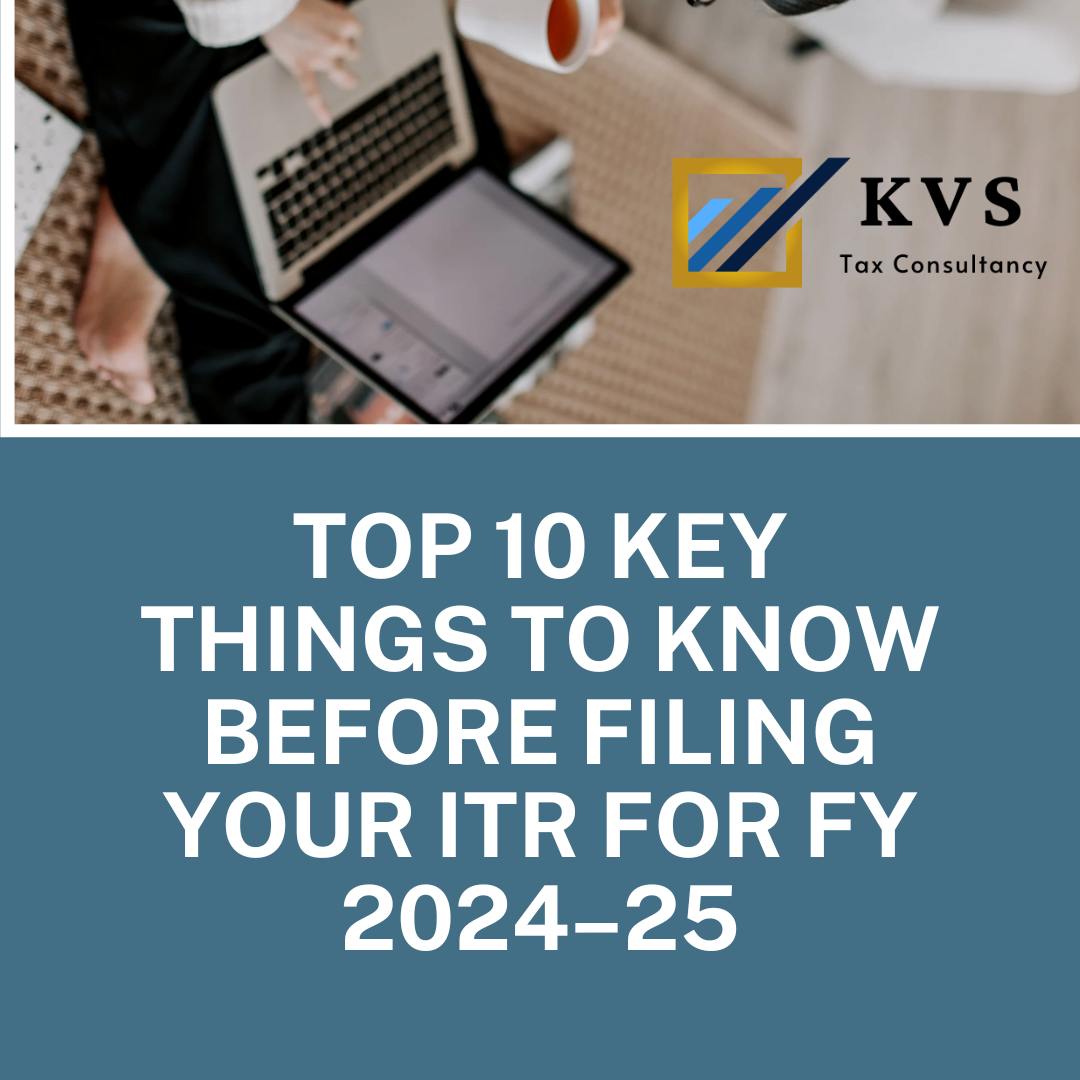
Top 10 Key Things to Know Before Filing Your ITR for FY 2024–25
Filing your Income Tax Return (ITR) isn’t just a legal requirement—it’s an important part of your financial planning. Whether you’re a salaried employee, a freelancer, or a business owner, being well-prepared can save you from last-minute stress, penalties, or missed refunds.
Here are the 10 most important points you should keep in mind before filing your ITR for the financial year 2024–25:
1. Know Your ITR Form
The Income Tax Department notifies different ITR forms for different categories of taxpayers. Choosing the wrong form can lead to your return being declared “defective.”
- ITR-1 (Sahaj): For salaried individuals with income up to ₹50 lakh
- ITR-2, 3, 4: For those with multiple income sources like capital gains, business income, etc.
✔️ Check the latest ITR form applicable to your case for FY 2024–25.
2. Choose the Right Tax Regime
You now have a choice between the Old Tax Regime (with deductions and exemptions) and the New Tax Regime (with lower slab rates but fewer exemptions).
👉 Analyze your income and eligible deductions to choose the most tax-efficient option before filing.
3. Gather All Required Documents
Ensure you have the following before starting:
- Form 16 (from your employer)
- Form 26AS (tax credit statement)
- AIS (Annual Information Statement)
- TDS certificates
- Interest certificates (FD, savings, etc.)
- Investment proof (80C, 80D, etc.)
- Capital gains statements (if any)
- Bank account details
4. Match Income with AIS & Form 26AS
Before submitting your return, reconcile your income details with your AIS and Form 26AS. Discrepancies may trigger notices from the Income Tax Department.
5. Declare All Sources of Income
Be sure to report all income:
- Salary, freelance, or business income
- Interest on savings or FDs
- Dividend income
- Rental income
- Capital gains from shares, crypto, or property
Even exempt income (like agricultural income) should be disclosed.
6. Claim All Eligible Deductions
If you’re under the Old Tax Regime, claim deductions under:
- Section 80C: LIC, PPF, ELSS, PF, tuition fees
- Section 80D: Health insurance premiums
- Section 24(b): Home loan interest
- Others: 80E, 80G, 80TTA, etc.
7. Report Foreign Assets & Crypto
If you have foreign assets, foreign income, or deal in cryptocurrencies, you must disclose them. Non-disclosure may result in strict penalties under the Black Money Act.
8. Pay Advance Tax (If Applicable)
If your total tax liability exceeds ₹10,000 in a year (and not covered under TDS), you’re required to pay advance tax. Ensure it’s paid on time to avoid interest under Section 234B and 234C.
9. File Before the Due Date
As of now, the due date to file ITR for individuals (not subject to audit) is 31st July 2025. Filing late can lead to:
- Late fees under Section 234F
- Interest on tax due
- Loss of certain deductions and carry-forward benefits
10. Verify Your Return
Filing is not complete until it’s verified! You can E-Verify via Aadhaar OTP, net banking, or by sending a signed ITR-V to CPC, Bangalore.
✅ Final Thoughts
Filing your ITR accurately and on time ensures compliance and opens doors for faster refunds, smooth loan approvals, and peace of mind. The FY 2024–25 filing season may also bring some changes or digital enhancements—so stay updated!
Need help with your ITR filing or tax planning? Let us know in the comments!
Disclaimer:
The information provided in this blog is for general informational and education purposes only and does not constitute financial, investment, or professional advice. Always conduct your own research or consult with a qualified financial advisor before making any investment decisions. Investing involves risk, and there is no guarantee of returns. The views expressed here are solely those of the author and do not reflect the opinions of any financial institution, company, or organization. KVSTAX is not responsible for any financial decisions or actions taken based on the content of this blog.

